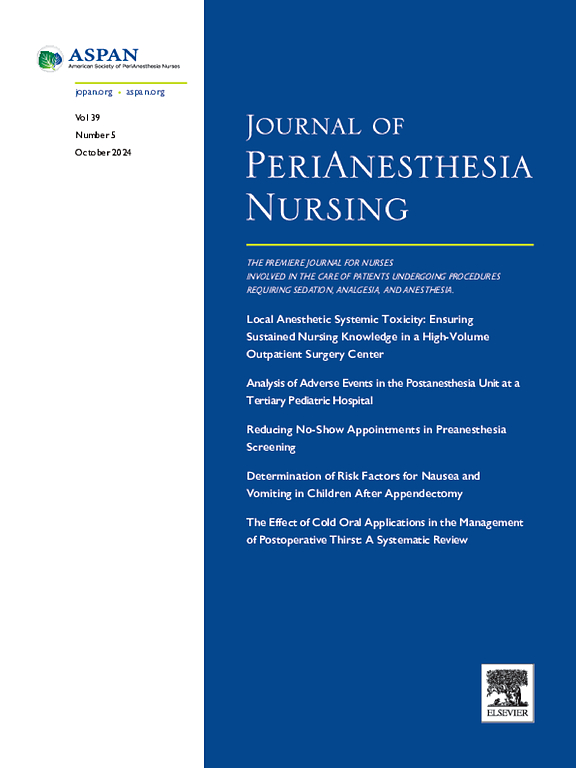The Effect of Nonpharmacological Methods on Preoperative Anxiety in Breast Surgery Patients: A Meta-analysis
IF 1.6
4区 医学
Q2 NURSING
引用次数: 0
Abstract
Purpose
To investigate the effect of nonpharmacological methods on anxiety before breast surgery, using the meta-analysis method.
Design
A meta-analysis.
Methods
Nine electronic databases were searched to identify studies published up to October 2023. The study was carried out in accordance with Preferred Reporting Items for Systematic Review and Meta-analyses 2020 and Cochrane 2021 recommendations. The Risk of Bias 2 tool was used to assess the risk of bias. Heterogeneity and publication bias were also assessed.
Findings
A search of 9 electronic databases identified 280 records. Six studies that met the inclusion criteria were eligible for meta-analysis. All the trials explained how the randomization was done. The studies selected were published between 2016 and 2022. A total of 519 female patients were included in the selected trials, 303 in the intervention group and 216 in the control group. The studies included aromatherapy, music, electro-acupuncture, and Yokukansan Kampo medicine practices. A meta-analysis was performed with anxiety levels measured immediately before surgery. In addition, a subgroup analysis was performed with trials that used anxiety-specific scales before surgery and trials that used aromatherapy.
Conclusions
The results of this meta-analysis indicated a moderate efficacy of nonpharmacological approaches, whereas aromatherapy showed a relatively lower efficacy in reducing preoperative anxiety in breast surgery patients.
非药物疗法对乳腺手术患者术前焦虑的影响:元分析
目的:采用荟萃分析法研究非药物疗法对乳腺手术前焦虑的影响:荟萃分析:检索了九个电子数据库,以确定截至 2023 年 10 月发表的研究。研究按照《2020年系统综述和荟萃分析首选报告项目》(Preferred Reporting Items for Systematic Review and Meta-analyses)和《科克伦2021》(Cochrane 2021)的建议进行。偏倚风险2工具用于评估偏倚风险。此外,还对异质性和发表偏倚进行了评估:在 9 个电子数据库中搜索到 280 条记录。符合纳入标准的六项研究有资格进行荟萃分析。所有试验都解释了随机化是如何进行的。所选研究发表于2016年至2022年之间。所选试验共纳入了 519 名女性患者,其中干预组 303 人,对照组 216 人。研究内容包括芳香疗法、音乐、电针和横断山堪布疗法。根据手术前测量的焦虑水平进行了荟萃分析。此外,还对手术前使用特定焦虑量表的试验和使用芳香疗法的试验进行了分组分析:这项荟萃分析的结果表明,非药物疗法的疗效适中,而芳香疗法在减轻乳腺手术患者术前焦虑方面的疗效相对较低。
本文章由计算机程序翻译,如有差异,请以英文原文为准。
求助全文
约1分钟内获得全文
求助全文
来源期刊

Journal of Perianesthesia Nursing
NURSING-
CiteScore
2.20
自引率
17.60%
发文量
279
审稿时长
90 days
期刊介绍:
The Journal of PeriAnesthesia Nursing provides original, peer-reviewed research for a primary audience that includes nurses in perianesthesia settings, including ambulatory surgery, preadmission testing, postanesthesia care (Phases I and II), extended observation, and pain management. The Journal provides a forum for sharing professional knowledge and experience relating to management, ethics, legislation, research, and other aspects of perianesthesia nursing.
 求助内容:
求助内容: 应助结果提醒方式:
应助结果提醒方式:


